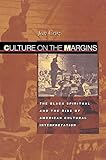Culture on the Margins : The Black Spiritual and the Rise of American Cultural Interpretation / Jon Cruz.
Material type: TextPublisher: Princeton, NJ : Princeton University Press, [1999]Copyright date: ©1999Edition: Core TextbookDescription: 1 online resource (280 p.)Content type:
TextPublisher: Princeton, NJ : Princeton University Press, [1999]Copyright date: ©1999Edition: Core TextbookDescription: 1 online resource (280 p.)Content type: - 9780691004747
- 9781400823215
- 782.25308996073
- ML3556.C78 1999
- online - DeGruyter
- Issued also in print.
| Item type | Current library | Call number | URL | Status | Notes | Barcode | |
|---|---|---|---|---|---|---|---|
 eBook
eBook
|
Biblioteca "Angelicum" Pont. Univ. S.Tommaso d'Aquino Nuvola online | online - DeGruyter (Browse shelf(Opens below)) | Online access | Not for loan (Accesso limitato) | Accesso per gli utenti autorizzati / Access for authorized users | (dgr)9781400823215 |
Frontmatter -- CONTENTS -- ACKNOWLEDGMENTS -- INTRODUCTION -- ONE. The Conundrum of Authenticity -- TWO. Sound Barriers and Sound Management -- THREE. From Objects to Subjects -- FOUR. From Authentic Subjects to Authentic Culture -- FIVE. From Testimonies to Artifacts -- SIX. Institutionalizing Ethnosympathy -- SEVEN. Conclusion -- EPILOGUE -- Notes -- BIBLIOGRAPHY -- SUBJECT INDEX -- SONGS CITED INDEX
restricted access online access with authorization star
http://purl.org/coar/access_right/c_16ec
In Culture on the Margins, Jon Cruz recounts the "discovery" of black music by white elites in the nineteenth century, boldly revealing how the episode shaped modern approaches to studying racial and ethnic cultures. Slave owners had long heard black song making as meaningless "noise." Abolitionists began to attribute social and political meaning to the music, inspired, as many were, by Frederick Douglass's invitation to hear slaves' songs as testimonies to their inner, subjective worlds. This interpretive shift--which Cruz calls "ethnosympathy"--marks the beginning of a mainstream American interest in the country's cultural margins. In tracing the emergence of a new interpretive framework for black music, Cruz shows how the concept of "cultural authenticity" is constantly redefined by critics for a variety of purposes--from easing anxieties arising from contested social relations to furthering debates about modern ethics and egalitarianism. In focusing on the spiritual aspect of black music, abolitionists, for example, pivoted toward an idealized religious singing subject at the expense of absorbing the more socially and politically elaborate issues presented in the slave narratives and other black writings. By the end of the century, Cruz maintains, modern social science also annexed much of this cultural turn. The result was a fully modern tension-ridden interest in culture on the racial margins of American society that has long had the effect of divorcing black culture from politics.
Issued also in print.
Mode of access: Internet via World Wide Web.
In English.
Description based on online resource; title from PDF title page (publisher's Web site, viewed 30. Aug 2021)


